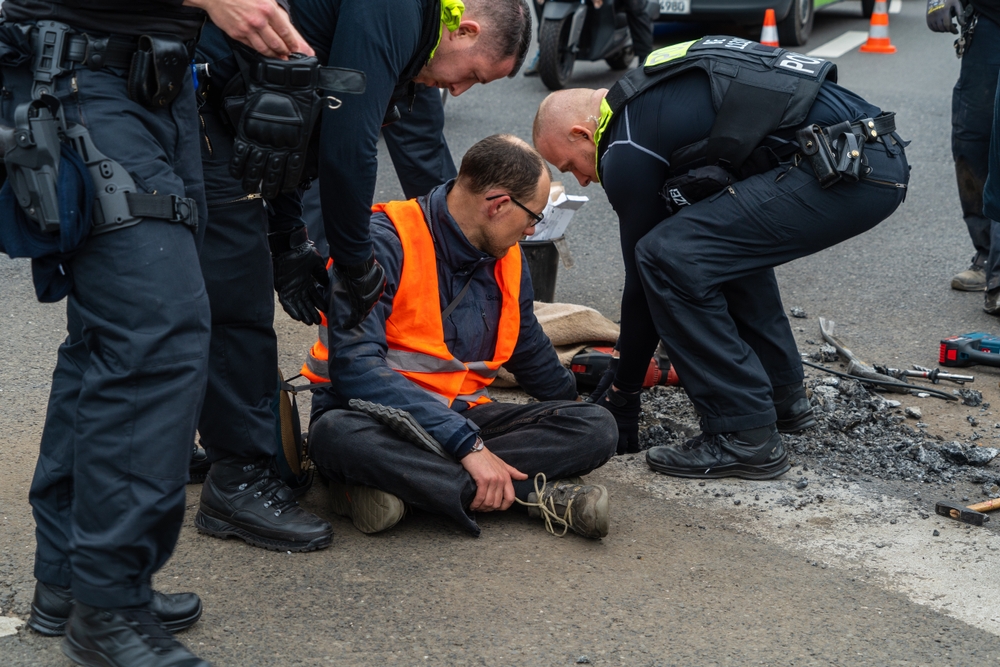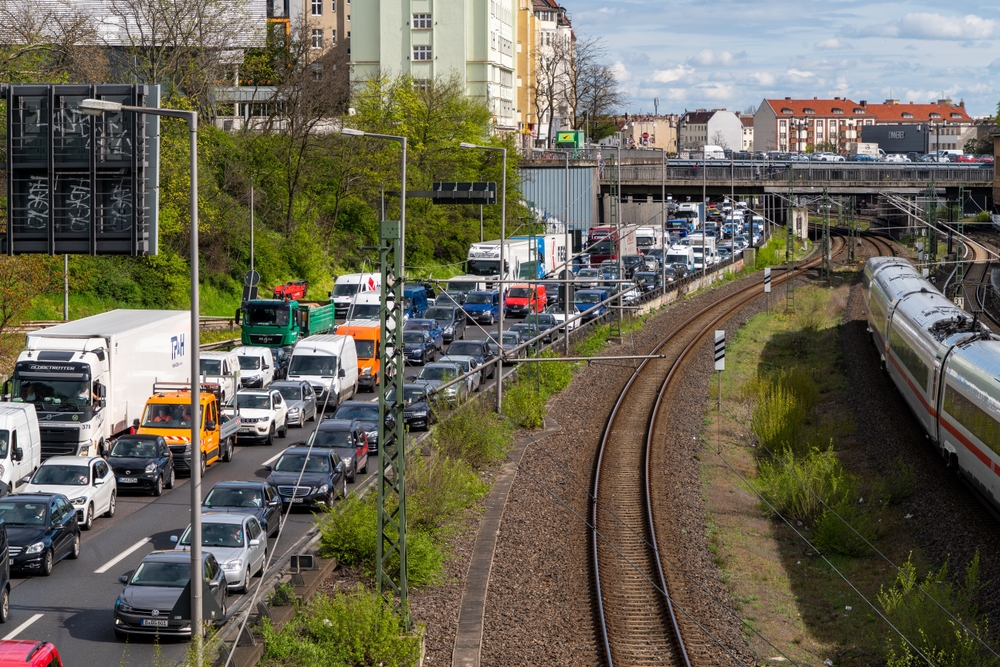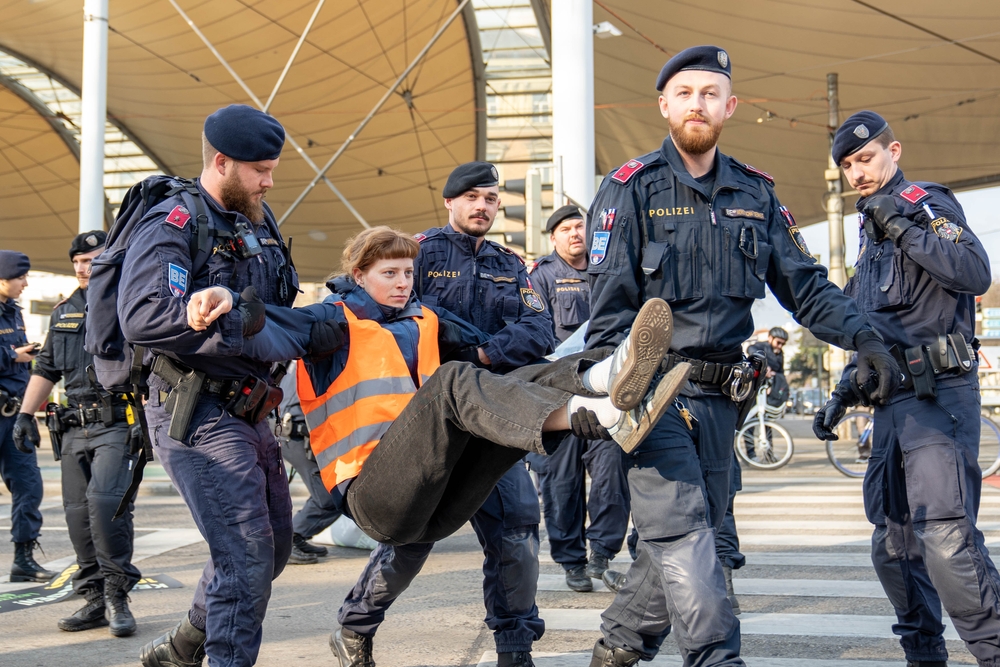For over a year now, the ‘Last Generation’ (in German ‘Letzte Generation’) has blocked roads all over Germany by glueing themselves to the street. Their goal: getting the German government to take action against climate change and raising awareness for the imminent climate catastrophe. The group of climate activists—often referred to as “climate gluers”—has stirred up controversy in Germany. Public opinion is largely negative towards the Last Generation, and there are increasingly harsh penalties for the activists. Again and again, the question is raised: are the Last Generation activists achieving their goals, or is their form of protest damaging the climate movement as a whole?
The Last Generation emerged at the beginning of 2022 and has since then attempted to disrupt German society. Recently, the activists have been prominent in the news because of their repeated protests in Berlin. While they are most known for glueing themselves to streets, the activists have also thrown mashed potatoes at a Monet painting (which was not damaged), turned off a gas pipeline, smeared paint over headquarters of political parties and glued themselves to the tarmac of airports in Berlin and Munich. This form of activism is typically described as civil disobedience, which entails legal violations but is both physically and verbally non-violent.
Still, public opinion about the Last Generation’s methods is largely negative. According to a survey by YouGov, 60% of the German population is against the street blockades and only 5% fully support this method of protesting. According to a member of the German parliament and the Green party, Katharina Dröge, the last generation has managed to “get on the nerves of normal people going about their day-to-day lives”. The public discourse on street blockades has become agitated and polarising. The term “climate terrorists” is used frequently and comparisons between climate activists and the Nazis or the Taliban have been drawn by members of the German parliament. Anger has sometimes boiled over and activists have been violently removed from the street by inconvenienced drivers.
But not only individual drivers are becoming more heavy-handed. Activists are increasingly being sentenced to prison or taken into preventative detention before they even have the chance to protest. The latter is sometimes referred to as the “Bavarian model”. Bavaria has the strictest rules in Germany for this form of civil disobedience, where activists can be placed in preventive detention for up to 30 days in anticipation of their participation in a street blockade. Calls for similar measures nationwide are getting louder. But critics of the “Bavarian model” are voicing concern over the limits it puts on the freedom and right to protest. According to lawyer Jochen Ringler, preventive detention should be used to prevent terror attacks or serious crimes and not to stop protests.


What exactly, other than awareness of the dangers of climate change, is the Last Generation protesting for? The activists demand a speed limit of 100 km/h on all German roads. A study by the Federal Environment Agency shows that this measure would save 5,4 tonnes of CO2 per year. A majority of the German population is for the introduction of a speed limit, but they support a less restrictive limit of 130 km/h. A second demand is the continuation of the 9€ ticket, which would allow everyone that buys it to use all public transport in the whole of Germany for a month. The 9€ ticket was introduced by the German government for three months during the summer of 2022 to relieve the German population from high energy, food and transport prices, and it was a great success at the time as over 52 million people made use of it. Additionally, the Last Generation demands the creation of a citizens’ council, which would consist of experts in politics, environment, society and economy as well as Germans representing every level of society. This council would work on ways to achieve carbon neutrality by 2030. Lastly, they demand that the German government would pursue the measures created by the council. A similar project was implemented in France in 2020 and relatively successfully so.
But how successful has the Last Generation been in achieving its demands? The recent protests in Berlin have prompted a meeting between activists of the Last Generation and transport minister Volker Wissing. The minister is a member of the Free Democratic Party (FDP), a liberal party which has been blocking the introduction of a speed limit in Germany. While no agreement was reached during the meeting, the activists later called it a constructive conversation. On a more regional level, mayors of several cities have written letters to the German government supporting the demands of the Last Generation, thereby reaching compromises with the activists and ending blockades in their cities. While some call this blackmail, the mayors justify their actions by clarifying that some of the demands of the activists actually align with the cities’ climate goals anyway.
What about raising awareness of the dangers of climate change in the German population? The Last Generation has clearly succeeded in getting attention. While a majority of Germans might view the Last Generation negatively, a recent study shows that roughly half of the participants think that their demands for a speed limit and a 9€ ticket are legitimate. And 44% of the participants in another study agreed with the activists that the German government is not doing enough about climate change.


But as the Last Generation is increasingly viewed critically by the German population, are they damaging or furthering the climate movement? It is hard to say. The more moderate climate movement Fridays for Future has distanced itself from the Last Generation, stating that the blockades are hurting their cause since they divide society. The street blockades often target commuters who cannot afford to live closer to their work, rather than those that actually contribute the most to climate change. But according to conflict researcher Felix Anderl, radical protests can increase support for moderate movements. In other words, Fridays for Future and other climate movements could potentially benefit from the Last Generation.
Another argument made is that Fridays for Future has run its course and that peaceful protests are not going to change how governments deal with climate change. Andreas Malm, a human ecology professor at Lund University, thinks that disruptive protest is necessary to bring about change. After all, this is how historically progress has been achieved. Attacks on famous artworks have been used by suffragettes fighting for the right to vote and activists protesting against the pharma industry. In the end, it is likely that the fight against climate change requires both moderate and radical protests.All in all, the Last Generation might be getting on people’s nerves, but it could also be the only way to get governments to respond to climate change. Carla Hindrichs, a spokesperson for the last generation describes the protest movement well: “We are like a fire alarm, which is annoying but necessary”.
By Annalena Herrmann








